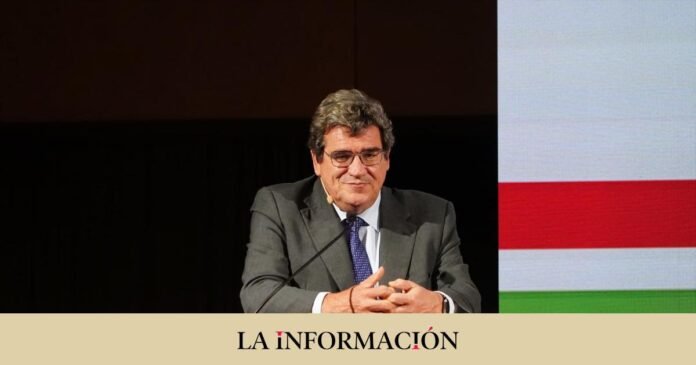With the New Year’s Eve grapes more than digested and the gifts of Three Kings open, the Ministry of Inclusion, Social Security and Migrations accelerates this week the work in search of an agreement on the second leg of the pension reform. The Executive intended to have approved the new battery of measures already at the end of last year so that it would have entered into force from January 1, as it had promised to the European Commission in the framework of the use of the Recovery, Transformation and Resilience that will continue to give Spain access to Next Generation funds.
The best thing would be for this agreement to arrive “in the coming weeks, before the end of January”, according to sources from the Department headed by José Luis Escrivá to this newspaper, who also confirm the acceleration that they plan to give to conversions from this same week. It will not be an easy task. The employers endured their message in the middle of last month as a result of Yolanda Díaz’s pact with EH Bildu on the ERE (the amendment to the Employment Law that de facto increases the control of the Labor and Social Security Inspectorate over regulation files of employment) and threatened sit-ins on structural reforms like this one.
It has been only the last of the clashes in recent months between the businessmen and the Executive of Pedro Sánchez. However, contacts within the framework of social dialogue to advance on the pending issues of the pension reform have also been maintained discreetly during the holidays, as the same sources admit. In the Government they remember that some of the reforms approved in the last year were already anticipated with a certain delay -such as the changes in the contributions of the self-employed, which came into force in July, four weeks later than expected. Although, the changes that are pending agreement and confirmation affect aspects of the pensions on which the difference between the social agents is even more evident.
The first of these is the gradual uncapping of the maximum contribution bases (of the contributions of the highest salaries to the Social Security system) between 2025 and 2050, a measure that would be accompanied by a review of the amount of maximum pensions although at a lower rate. In fact, according to the latest official proposal presented to unions and employers, which this newspaper advanced in mid-December, Escrivá would postpone the accumulated real increase of 30% for the highest pensions to 2065 – to make it converge over the next decades with the expected increase in the maximum bases.
Also on the ministers’ table are improving the coverage of contribution gaps and other measures that will also contribute to reducing the gender gap in pensions, and that would be added to the supplement that came into force last February. According to the latest available data on the pension payroll, the gender gap reaches 28.1% in retirement pensions -it is what men receive on average more than women at the time of retirement-. The Executive could improve the coverage of periods of leave for family care and reduced working hours for childcare and would also be contemplating an extra increase in the annual revaluation of 10% of the gender gap complement between next year and 2025.
The ‘hot potato’ of the computing period
But above these measures, the ‘hot potato’ is in the decision to include in the text a proposal to gradually extend the period used to calculate the pension from the current 25 years to a total of 30 years of contributions, with the possibility of discarding the two worst years of listing. This proposal, which according to the social agents was not included in the recommendations of the Toledo Pact Commission, not only generates animosity between businessmen and unions, but has also brought new disagreements to the government coalition, since the members of United They refuse to support any measure that could lead to a de facto reduction in pensions, as they believe will happen if the calculation period is extended.
From the CEOE they have made it clear that the new measures will hardly be able to count on their support. Above all because the employers are not willing to give in on those measures that may entail an additional increase in costs for companies. Regarding the latter, another of the economic ministries, that of Labor and Social Economy, also intends to close before the end of this month the increase in the interprofessional minimum wage (SMI). The Government has already extended the current SMI, which stands at 1,000 euros per month, within the royal decree of economic measures to deal with the effects of inflation approved at the end of December. The experts from the Ministry proposed an increase that would be between 4.6% (which would allow reaching 1,046 euros per month in 14 payments) and 8.2% (for a salary of 1,082 euros) to be applied retroactively from the January 1.

